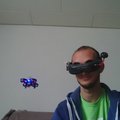
@13r1ckz I recommended a couple of books earlier in the chat:
https://www.manning.com/books/deep-learning-with-python
https://www.amazon.com/Hands-Machine-Learning-Scikit-Learn-TensorFlow/dp/1491962291
![]() @Daniel Situnayake yeah actually, working on an algorithm to detect various open surgical tools identified so that it can help us out categorizing them after being jumbled in a surgery. any resources I can jump start from, typically a dataset, or do you advise me to build my own and work my way up?
@Daniel Situnayake yeah actually, working on an algorithm to detect various open surgical tools identified so that it can help us out categorizing them after being jumbled in a surgery. any resources I can jump start from, typically a dataset, or do you advise me to build my own and work my way up?
 Is there an example(s) with YOLO + ML combo implementation with a MCU?
Is there an example(s) with YOLO + ML combo implementation with a MCU?

![]() Thank you for that link, and I second 'Deep learning with python' for a beginner.
Thank you for that link, and I second 'Deep learning with python' for a beginner.
 @Daniel Situnayake wow great ill get those books asap
@Daniel Situnayake wow great ill get those books asap
 @as.instrumedglobal that's very interesting! I think you'd likely need to find or build a dataset first, then you could use transfer learning to re-train an existing model to recognize the surgical tools
@as.instrumedglobal that's very interesting! I think you'd likely need to find or build a dataset first, then you could use transfer learning to re-train an existing model to recognize the surgical tools
 @Don Gabriel not that I know of!
@Don Gabriel not that I know of!
 @as.instrumedglobal this blog post I just found shows how you can do transfer learning with an object detection model (which can identify multiple instances of multiple classes of object in an image): https://medium.com/practical-deep-learning/a-complete-transfer-learning-toolchain-for-semantic-segmentation-3892d722b604
@as.instrumedglobal this blog post I just found shows how you can do transfer learning with an object detection model (which can identify multiple instances of multiple classes of object in an image): https://medium.com/practical-deep-learning/a-complete-transfer-learning-toolchain-for-semantic-segmentation-3892d722b604
 Also, RISC-V seems to more becoming popular. Any ML / DL ports for RISC-V in the future?
Also, RISC-V seems to more becoming popular. Any ML / DL ports for RISC-V in the future?
 OK, I better head out and finish off writing this book :D Ping me on Twitter if you have any more questions!! https://twitter.com/dansitu
OK, I better head out and finish off writing this book :D Ping me on Twitter if you have any more questions!! https://twitter.com/dansitu
 Thank you everyone!!
Thank you everyone!!

 I am comfortable with PICs since I have used them for many years
I am comfortable with PICs since I have used them for many years
 if only they had an open source toolchain...
if only they had an open source toolchain...
 @Max-Felix Müller atmegas are on the smaller side of the microcontroller families, might be enough to do a simple perceptron, but 2kB of ram doesn't work well with bigger nets
@Max-Felix Müller atmegas are on the smaller side of the microcontroller families, might be enough to do a simple perceptron, but 2kB of ram doesn't work well with bigger nets
 open source toolchain for PICs? RISC-V does
open source toolchain for PICs? RISC-V does
 with an open source programmer as well?
with an open source programmer as well?
 I just started experimenting with RISC-V and seems promising
I just started experimenting with RISC-V and seems promising

![]() @Daniel Situnayake hmmm yeah I figured I'd have to do that since I couldn't find any. well, I think it can be an interesting project to work on, and I have access to plenty surgical sets from work so I know I can get decent info at least for the common tools. Thanks for the help and to all the Tensorflow Dev team, keep up the great work! To the peeps from Adafruit, your hardware makes me drool and everytime I check you Insta feed there's one more board that goes on the bucket list :D
@Daniel Situnayake hmmm yeah I figured I'd have to do that since I couldn't find any. well, I think it can be an interesting project to work on, and I have access to plenty surgical sets from work so I know I can get decent info at least for the common tools. Thanks for the help and to all the Tensorflow Dev team, keep up the great work! To the peeps from Adafruit, your hardware makes me drool and everytime I check you Insta feed there's one more board that goes on the bucket list :D
 @Max-Felix Müller you can always add external memory, but it would be sloooooow
@Max-Felix Müller you can always add external memory, but it would be sloooooow
![]() Microchip now has a bunch of ARM processor cores, including the M7 Core, that they program using the same toolchain, and have hung the same old peripherals on them, so not a big transition.
Microchip now has a bunch of ARM processor cores, including the M7 Core, that they program using the same toolchain, and have hung the same old peripherals on them, so not a big transition.
 cool thx gh78731
cool thx gh78731

 @Max-Felix Müller you know, someone actually ran a Linux kernel on an UNO with additional ram, running an ARM emulator...
@Max-Felix Müller you know, someone actually ran a Linux kernel on an UNO with additional ram, running an ARM emulator...
 @Max-Felix Müller it only took about one week to boot
@Max-Felix Müller it only took about one week to boot
 can we do facial recognition effectively at the edge? Just curious
can we do facial recognition effectively at the edge? Just curious
 @Don Gabriel sure, there is that esp32 camera board that does it
@Don Gabriel sure, there is that esp32 camera board that does it
 for $10 or something
for $10 or something
 Summarizing resources to get started (tip: try out the codelabs aka tutorials first)
Summarizing resources to get started (tip: try out the codelabs aka tutorials first)
For mobile and micro-controllers (in general):
Codelab: https://codelabs.developers.google.com/codelabs/recognize-flowers-with-tensorflow-on-android/#0
Tensorflow Lite: https://www.tensorflow.org/lite
For micro-controllers only:
Codelab: https://codelabs.developers.google.com/codelabs/sparkfun-tensorflow/#0
Tensorflow Lite for MicroControllers:
https://www.tensorflow.org/lite/microcontrollers/overview
(github) https://github.com/tensorflow/tensorflow/tree/master/tensorflow/lite/experimental/micro
For machine learning:
Andrew NG’s Machine Learning Course and Deep Learning Specialization
(Available on youtube and coursera for free)
UPCOMING: Watch out for the TinyML book release in January 2020: http://shop.oreilly.com/product/0636920254508.do (@Pete Warden and @Daniel Situnayake have done an excellent job to consolidate all resources into one book -- for anyone who wants to get started in this field)
 Lutetium
Lutetium
Discussions
Become a Hackaday.io Member
Create an account to leave a comment. Already have an account? Log In.